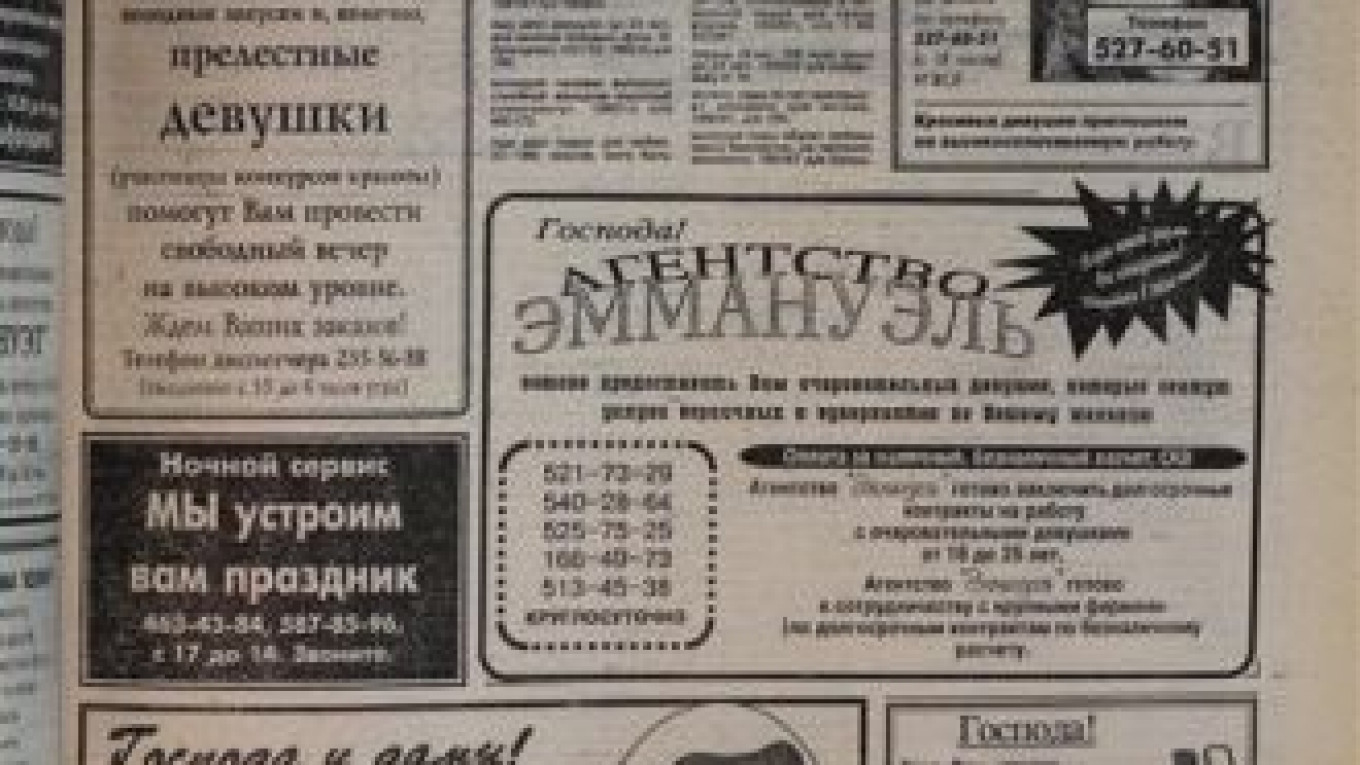ST. PETERSBURG — "I want to marry a millionaire"; "I will give driving lessons to an 18-year-old girl"; and "I'd like to trade my washing machine for a portable TV" are examples of classifieds placed in newspapers in the early 1990s, when advertising began to take its first steps in Russia, a country that back then knew little about marketing.
The entire collection of the first ads published in one of St. Petersburg's first advertising newspapers, Reklama Shans, is now on display as part of an exhibition titled "The History of New Russia Through Classifieds" at Loft Project Etagi through March 28.
Russia was undergoing dramatic changes, the exhibition's organizers said, and the ads mark out historic milestones like the cheap Royal spirit — 96 percent alcohol — that sold like hot cakes when other kinds of alcohol were unavailable and the disastrous MMM financial pyramid scheme in which thousands lost their life savings.
The diverse subjects of the advertisements range from household items, real estate and businesses to personal ads and entertainment reflecting how the country and the needs and desires of its citizens changed from 1991 to 2011.
It was a time when people rushed to explore all aspects of life from new angles.
It was also the moment when a sexual revolution hit the country, and people suddenly allowed themselves to do things that they could never even have voiced in the past. Advertising newspapers became flooded with blunt, to-the-point partner searches.
"I'm looking for a girl no older than 23 years old for lovemaking. I'm a bodybuilder," one young man wrote in his ad. "An athletic and gentle but poor young man is looking to meet a wealthy woman," another wrote. "A young couple is looking forward to unusual sex offers," another ad read.
Others wanted to meet a female "doctor or artist," "a bride for a businessman from the United States," or "a nice girlfriend with big breasts." Some did not hesitate to inform readers that they were married, but still "looking for a girlfriend to relax and have sex with." The "girlfriend" was also to have an apartment where they could meet.
Gay people, who had been forced to lead very secretive intimate lives in the Soviet Union under pain of prosecution (male homosexuality was not decriminalized until 1993), could now use advertising to help search for "a gay friend no older than 30 and no shorter than 180 centimeters," or for "a friend interested in self-flagellation."
The unstable economic situation in the country, however, caused people to be careful with their money and savings, and many of them preferred to simply exchange goods. The classifieds were bursting with all kinds of exchange offers, such as trading "a vacuum cleaner for a food processor," "a KamAZ truck for an apartment," "a box of 100-
millimeter nails for a box of 50-millimeter nails," "a Russian-English dictionary for an English-Russian dictionary," "Finnish ground meat for babies for foreign-made squash for babies," "moose antlers for a rifle," or even "an invitation to Israel for a Dnepr-brand bike."
In turn, emerging entrepreneurs hurried to offer their goods and services, including an "infertility treatment via massage," "learning English under hypnosis in 10 days," "lessons in how to make a million rubles by baking doughnuts," or even "sending Madonna's exact address."
"If you feel like you're really missing something, ask yourself if it's a carpet!" read one of the ads on display, presumably placed by a carpet dealer.
Maxim Kuzakhmetov, deputy head of Shans publishing house in the 1990s, said that back then, Reklama Shans published as many as 10,000 ads in just one issue.
"Many people couldn't believe that we really received so many ads," Kuzakhmetov said in an interview about the display shown on screens at the exhibit. "They thought we were making them up and thought that the biggest mystery was how we invented so many phone numbers for the classifieds."
When from time to time, the newspaper editors would accidentally make typos in an ad's phone number, causing people to call the wrong number, the owner of the number printed would get quite a hard time.
"It was lucky if they got calls from people who had read someone's ad for juice sales. It was much worse if it was some kind of sexual ad," Kuzakhmetov said.
Sergei Stillavin, a Russian radio host who once worked at Reklama Shans, said some sections of the newspaper represented the origins of future social networks, where people simply published greetings and messages for their friends.
Over the years, St. Petersburg residents have published 30 million classifieds in Reklama Shans, the exhibit's organizers said.
Anna Borisova, a 45-year-old visitor to the exhibition, said she even felt some nostalgia for the early '90s when looking at the ads.
"I'd say they're mixed feelings," she said. "On the one hand, these classifieds remind us of the time when we were young and when the things featured in the ads were indeed parts of our lives. On the other hand, now we can see how primitive and naive people were about business in Russia at that time, how much they had to learn about it to make it civilized — and look civilized," Borisova said.
"The History of New Russia Through Classifieds" runs through March 28 at Loft Project Etagi, 74 Ligovsky Prospekt. Metro Ligovsky Prospekt. Tel. (812) 458 5005. .
A Message from The Moscow Times:
Dear readers,
We are facing unprecedented challenges. Russia's Prosecutor General's Office has designated The Moscow Times as an "undesirable" organization, criminalizing our work and putting our staff at risk of prosecution. This follows our earlier unjust labeling as a "foreign agent."
These actions are direct attempts to silence independent journalism in Russia. The authorities claim our work "discredits the decisions of the Russian leadership." We see things differently: we strive to provide accurate, unbiased reporting on Russia.
We, the journalists of The Moscow Times, refuse to be silenced. But to continue our work, we need your help.
Your support, no matter how small, makes a world of difference. If you can, please support us monthly starting from just $2. It's quick to set up, and every contribution makes a significant impact.
By supporting The Moscow Times, you're defending open, independent journalism in the face of repression. Thank you for standing with us.
Remind me later.






